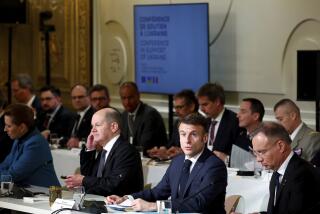European Powers Won’t Help Arm, Train Bosnia Army
- Share via
WASHINGTON — The Clinton administration’s bid to muster international help to arm and train the Bosnian government army received a serious setback Thursday as several key European countries served notice that they will not provide significant help.
With a meeting of potential donors scheduled for Ankara, Turkey, today, France, Britain, Germany and the Netherlands have all declined to contribute substantially. Other potential donors, such as Saudi Arabia, have signaled that they too may hold back.
U.S. officials worry that a poor showing at the Ankara conference could undermine their efforts to stabilize Bosnia-Herzegovina so that U.S. peacekeeping troops can leave by the end of this year, as President Clinton has promised.
In particular, Washington had hoped to amass a sizable list of contributors in Ankara to prod the Muslim-led government of Bosnia into ejecting about 800 remaining Islamic militiamen from the country and severing their military ties with Iran.
Meanwhile, Secretary of State Warren Christopher called senior officials of the three Balkan factions to a meeting in Geneva on Monday to discuss ways to shore up compliance with the Dayton accord in the face of increasing strains in the peacemaking process.
The session, which officials said is expected to last half a day, was designed as a prelude to a high-level conference on Bosnia in Moscow on March 23. Christopher is scheduled to be in Geneva on Monday anyway for a meeting on the comprehensive nuclear test-ban treaty.
U.S. officials said the Geneva session, which will include officials of Britain, France, Germany and Russia, will focus on continuing disputes between the Bosnian Muslims and Bosnian Croats, the refusal of Serbs to live in Muslim-run Sarajevo and economic reconstruction.
Assistant Secretary of State John Kornblum, who has just replaced Richard C. Holbrooke as the chief U.S. mediator in the Bosnian arena, is expected to fly to Geneva for the session, which will be the first such meeting since he assumed that post.
The setback in the arm-and-train effort came amid growing congressional concern about the Bosnian Muslims’ ties with Islamic militants.
The Senate voted Wednesday to withhold $200 million in aid to Bosnia unless the Muslim government stops sharing intelligence with Iran.
Washington wants to boost the military capability of the Muslims to bring “military balance” to the region and to try to prevent the Bosnian Serbs from resuming their attacks once U.S. and other North Atlantic Treaty Organization peacekeeping forces have left.
The Dayton peace accord calls for achieving this balance through arms-reduction negotiations among the three warring factions, but the administration believes that the arms-control talks alone will not be enough and that arms aid to the Muslims will be needed.
But key European countries, particularly France, have been cool to the U.S. plan because they fear that arming the Muslims will unsettle the Bosnian Serbs and set off a new arms race among the warring parties, possibly even prompting the Serbs to attack NATO peacekeepers.
Washington argues that the arm-and-train program can be kept separate from the peacekeeping operation with the organization of a separate international effort comprising contributions of money or weapons from a broad array of donor countries.
Clinton already has pledged to donate $100 million of surplus U.S. military equipment to the effort, and U.S. officials had hoped to have the program officially underway by March 6--the day the Dayton accord set for lifting arms importation restrictions in Bosnia.
But continued reluctance by the Europeans and other U.S. allies has forced Washington to postpone its plans.
The State Department had expected to announce the name of a private contractor to head the training portion of the program, but that too has been put off.
It was not immediately clear Thursday whether the three warring factions would be represented by their presidents or by lower-ranking officials at Monday’s meeting in Geneva. U.S. officials said Thursday that that probably would not be decided until the weekend.
However, the three presidents, Slobodan Milosevic of Servia, Franjo Tudjman of Croatia and Alija Izetbegovic of Bosnia all are expected to attend the March 23 meeting in Moscow. Tudjman, who has been ill, was released from the hospital Thursday.
Besides the other issues, the meeting in Geneva on Monday is expected to center on how to step up efforts by the Muslims to rid Bosnia of Islamic fighting forces, the arm-and-train effort and the scheduled elections in Bosnia now set for early spring.
More to Read
Sign up for Essential California
The most important California stories and recommendations in your inbox every morning.
You may occasionally receive promotional content from the Los Angeles Times.










